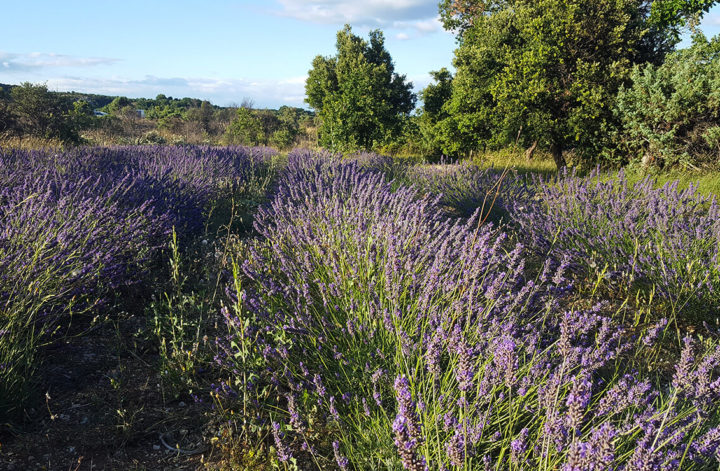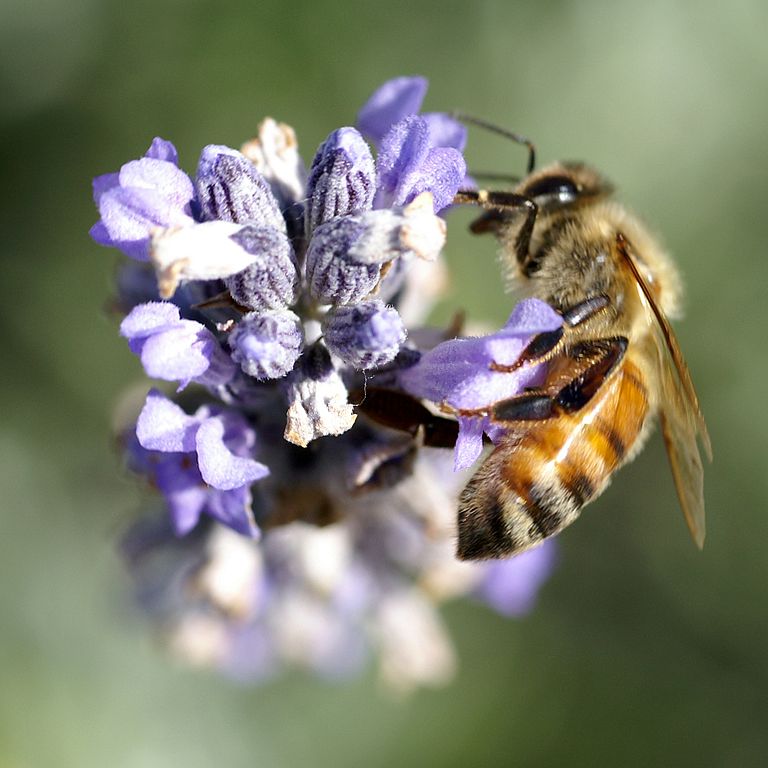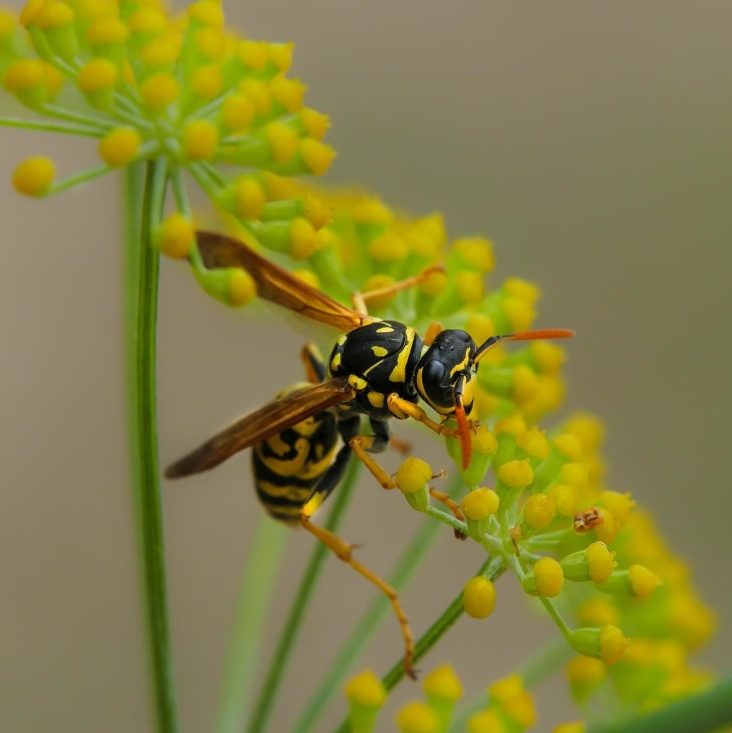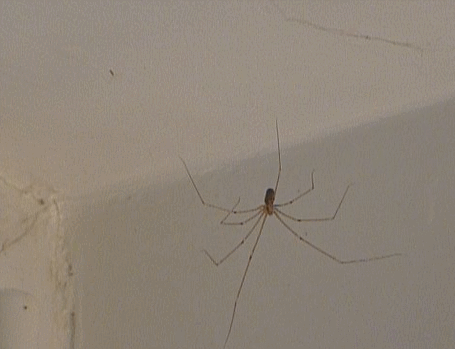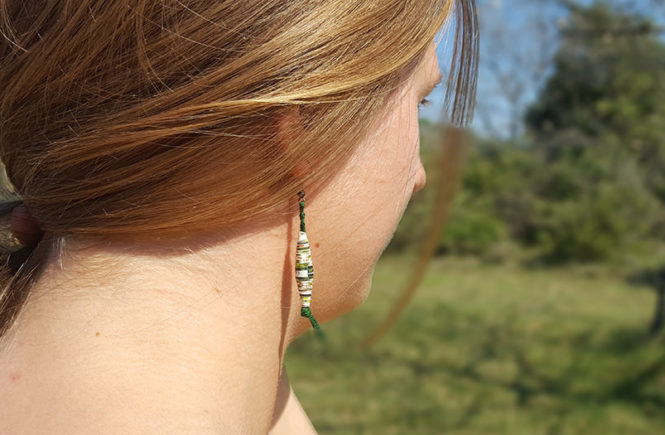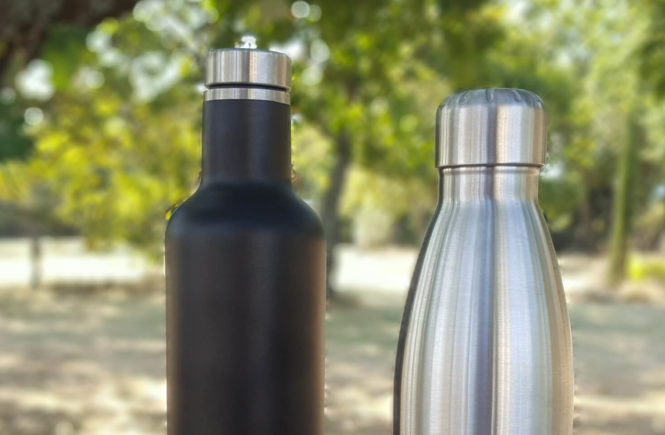In nature, there are many insects, big and small. It is often the small ones that bother us the most. We usually kill them without much thought, often with chemicals that are quite harmful to the environment (and to our lungs). We therefore propose that you get to know the insects of the campsite better and find a way to live with these creatures that we would sorely miss if they disappeared. Come and live in nature!
Bees and wasps
Let’s start with the stars of summer!
How do you recognise them?
In general, bees are quietly foraging for flowers and don’t mind you too much unless you get them stuck in an item of clothing or under your foot. Wasps can be more of a nuisance, often taking an interest in your melon or ham at mealtime.
Here you will certainly come across them on your way to our large swimming pool. When it is very hot, many of them come to drink because there is no water in the area. So like you, they come to the pool. It is sometimes impressive but don’t panic, they only sting to defend themselves. Just walk slowly through the foot bath and everything will be fine.
Pollinators in danger
In fact, there are many different species of bees, wasps, bumblebees, hornets, etc. Whether solitary or social, they all play an important role in the pollination of plants. Although bees are often associated with honey, which we enjoy, it is through pollination that they are indispensable. Without them, most plants would not be able to reproduce or produce fruit. We would have nothing to eat.
Today, pollinating insects are under serious threat, notably from the use of pesticides, monoculture, intensive agriculture, land use change, habitat destruction and climate change. This is why we need to take care of them.
Bonus: wasps are great predators of flies and mosquitoes. Nice, isn’t it?
So what do we do?
The first thing to do when you come across an insect of this family is to remain calm. It will quickly move on. Then some advice on how to live together:
- Avoid leaving food out in the open, a small lid is sufficient. The same goes for water.
- At the swimming pool, a vinegar-based repellent is also available to spray the beach and scare them away without killing them.
- On a more general note, avoid using chemical products in aerosols or on your plate.
Ants
Fun fact: there are more than 12,000 species of ants and their total mass – about a billion billion individuals – exceeds the weight of humanity. They owe their success to their well-known social organisation and their ability to eat just about anything they find.
Their roles in nature
- Through their galleries, they work the soil and make it more fertile.
- Ants “clean” certain plants of their parasites, thus allowing them to develop.
- They disperse certain seeds and encourage their germination.
- Finally, they also clean nature of many dead animals, thus preventing the spread of diseases.
So what do we do?
Here you will probably meet the Crematogaster scutellaris. It has a red head and a black body. It has the peculiarity of being able to raise its abdomen above its head when it is in danger, hence its nickname of acrobat ant. This species nests in the woods and can sometimes invite itself into your accommodation.
Some tips on how to limit their encounter:
- It is best to pack your food well, leave nothing lying around and clean the kitchen well.
- Also avoid leaving water around the sink, as they may come and drink from it.
- Put a few slices of lemon or sprinkle lemon juice in the areas where they come. We have also been told that they don’t like rosemary, so feel free to pick some from our beds.
- Outside, you can also block their path with coffee grounds.
Spiders
There are obviously many species here, especially in the garrigue. You may come across some magnificent ones along the way. Do some research and a whole world will open up to you. Although they have a bad reputation, the European species are perfectly harmless.
In the accommodation or at the sanitary facilities, you will mostly see the Pholcus phalangioides, a spider that is easy to identify with its long legs and small abdomen. Totally harmless, it can often be seen in the corners of rooms, high up. In fact, it is quite funny because if it feels in danger, it vibrates its web to move so fast that it disappears from our sight.
Insect hunters
Their main role is to capture insects such as flies and mosquitoes. The phalangid moth can even capture other spiders. They are great partners, so you can let them live their lives without worry.
If I am afraid, what can I do?
To begin with, you should know that a spider can reweave in just a few hours. Even regular and careful cleaning cannot prevent spider webs. However, if you want to avoid their presence you can:
- Put tomato leaves near the windows, they don’t like that.
- The same with lavender, a few sprigs near the openings, to be picked in our lavender field or a little essential oil. And it smells good!
- Finally, you can spray a little white vinegar around the windows, it doesn’t smell as good but it’s effective.
Mosquitoes
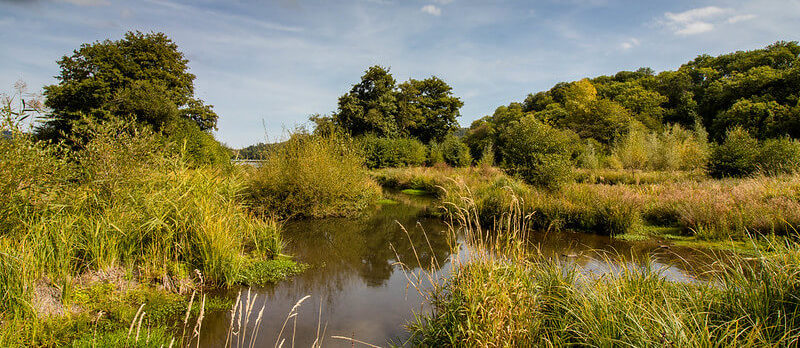
We finish with the mosquitoes, usually not very present in the region because there is not much water.
Are mosquitoes really good for anything?
It is less well known, but mosquitoes feed on flower nectar and therefore also help to pollinate plants.
They are especially important in wetlands. The larvae filter up to 2L of water per day, and are a natural purification station for these stagnant waters. They contribute to the ecological health of these areas and are even an indicator of the richness of the biodiversity found there. Finally, the larvae and adults form part of a food chain by feeding other insects and birds. Very useful, we tell you!
They are obviously known for their propensity to transmit diseases. In France, however, this is very rare. The main disadvantage is therefore an itchy pimple, and perhaps a disturbed night.
So what do we do?
Firstly, to avoid flying insects of all kinds, turn off the lights when you open your tent or the windows of your accommodation. For mosquitoes in particular, here are some tips:
- Eating cheese, drinking beer or putting on perfume attracts them. Use this information as you see fit 😉
- There are no really effective repellents that are harmless to humans, wearing large loose clothing remains the best protection.
- We avoid stagnant water outside where they will come to lay their eggs.
- More generally, we keep or create natural wetlands, like our natural pond, where all the predators are there to regulate their population.
Come and live in nature with the insects of the campsite
We hope that after reading this, you will feel less apprehensive – or more pleased? – to come across the insects on the campsite. In the end, they are not very annoying, given their great usefulness to the living world. Living in nature also means accepting their presence. Moreover, contrary to popular belief, their presence is not dirty but rather a sign of a healthy environment. Have a good holiday!
– Romain
